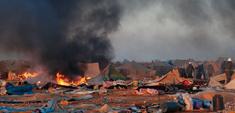
human rights monitoring in western sahara
thomas o’bryan
advocacy coordinator
western sahara campaign
The United Nations stands behind its proud record of promoting the universality and indivisibility of human rights, and for many decades the institution has played an incredibly valuable role in promoting peace and stability around the world.
However, in the Western Sahara, the UN has clearly failed in its legal and moral obligations towards the Saharawi people. MINURSO, first deployed in 1990 with the mandate to promote a referendum on the issue of self-determination in Western Sahara, has categorically failed in this regard. In 2013, with the recent politicised trial of the Gdeim Izik protestors in Rabat, immediate resolution of the conflict seems as unlikely as ever before.
There is, for the moment at least, a ceasefire between the Frente POLISARIO and the Moroccan Government. Yet, while formal armed conflict may have frozen under the terms of the ceasefire, human rights violations continue unabated.
The human rights of the Saharawi people, as defined by conventional international law, are violated on an intentional and systematic basis by the Moroccan Government. The Moroccan authorities have engaged in a campaign of ‘cultural genocide’, seeking to destroy Saharawi identity and history through a brutal crackdown on Saharawi musicians, poets, artists. This ‘cultural genocide’ even extends to naming rights, with allegations of Moroccan authorities banning certain Saharawi names in favour of ‘Moroccan’ ones.
Journalists, activists and bloggers alike operate in a climate of fear. Assertion of the Saharawi right to self-independence, or criticising the violent oppression enforced by the Moroccan authorities, almost inevitably leads to harassment, violence, torture and even murder of the instigators. With reports of plainclothes policemen cutting the shape of the Moroccan star into the chest of one activist, these deplorable actions clearly represent ‘cruel and unusual punishment.’
With the rise of social media, the Moroccan authorities are presented with new powers to enforce the crackdown on the Western Saharan population. A seemingly innocent Facebook status, or ‘Tweet’, can often lead to imprisonment or worse at the hands of the Moroccan government. Leading international human rights groups, such as Amnesty International and Reporters Without Borders, have strongly condemned the Moroccan authorities for their flagrant disregard for the basic human rights of the Saharawi population.
It is remarkable that MINURSO has merely stood, a silent witness to these crimes against humanity. MINURSO enjoys neither the resources nor the legal mandate to enforce the human rights monitoring that is so clearly and so desperately needed in Western Sahara.
Indeed, MINURSO is the sole UN peacekeeping operation in existence to not be charged with human rights monitoring. MINURSO thus represents an extraordinary break from customary international norms, with the UN categorically failing to protect the rights of the vulnerable Saharawi people who so desperately need their help.
International experts believe that a relatively small human rights monitoring force – perhaps with 50 civilian staff members, or even less – empowered with universal access to the territory, and the ability to disseminate their findings directly to the UN Security Council, would make an enormous difference.
This difference could be quantified not only in terms of protecting the fundamental and universal human rights of all the world’s people, including the long-forgotten Saharawi, but could help to promote the resolution of the wider conflict for the Western Sahara. The current lack of clear, objective, quantitative data on the nature and scale of the violations being committed would advance the international community’s understanding of the situation beyond mere allegations. The lack of clarity in this regard has served to entrench distrust and fuel anger between the two parties to the dispute. Human rights monitoring is thus a crucial step in restabilisation, reconciliation, and resolution.
In late April 2013, the UN Security Council will vote on MINURSO’s new mandate in Western Sahara. Certain countries, in particular France, have constantly obstructed attempts to empower MINURSO to monitor human rights violations in the country.
It is clear that the human rights situation in Western Sahara is worsening at a concerning pace. It is essential that this year the United Nations lives up to its moral and legal responsibilities to the Saharawi people, and introduces human rights monitoring into the legal mandate of MINURSO.
Join the Western Sahara Campaign in demanding action this year. Please visit the WSC website at www.wsahara.org.uk or alternatively if you have any questions please email Thomas O’Bryan, Advocacy Coordinator at info@wsaforum.org
images from the western sahara campaign www.wsahara.org.uk


